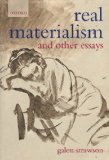new book by Galen Strawson: ‘Real Materialism: and Other Essays’
Written on July 25, 2008
 Real Materialism: and Other Essays by Galen Strawson (Oxford University Press, 2008). Amazon claims to have it in stock, while Oxford says it hasn’t been published yet. Product description:
Real Materialism: and Other Essays by Galen Strawson (Oxford University Press, 2008). Amazon claims to have it in stock, while Oxford says it hasn’t been published yet. Product description:
Real Materialism draws together papers written over twenty years by Galen Strawson in philosophy of mind and metaphysics. Strawson focuses on five main areas of enquiry: [1] the nature of the physical, consciousness, the “mind-body problem”, and the prospects for panpsychism; [2] the self, the subject of experience, self-consciousness, and the “narrative” self; [3] free will and moral responsibility; [4] the nature of thought and intentionality and their connection with consciousness; [5] the problem of causation with particular reference to the philosophy of David Hume.
Table of Contents from the publisher:
Introduction
1. Real Materialism
2. Realistic monism: why physicalism entails panpsychism
3. Can we know the nature of reality as it is in itself?
4. Red and ‘red’
5. Self, body, and experience
6. What is the relation between an experience, the subject of the experience, and the content of the experience?
7. Against narrativity
8. Episodic ethics
9. Mental ballistics: the involuntariness of spontaneity
10. Intentionality and experience: terminological preliminaries
11. Real intentionality: why intentionality entails consciousness
12. On the inevitability of freedom (from the compatibilist point of view)
13. The impossibility of moral responsibility
14. Consciousness, free will, and the unimportance of determinism
15. Free agents
16. Realism and causation
17. The contingent reality of natural necessity
18. David Hume: objects and power
19. Epistemology, semantics, ontology, and David Hume
Bibliography
Index
“Against Narrativity” is available online (probably an earlier version than the one in the book). Strawson argues against the narrative view of the self in both descriptive and normative versions based on a distinction between Diachronic and Episodic forms of self-experience. The Episodic “has little or no sense that the self that one is was there in the (further) past and will be there in the future, although one is perfectly well aware that one has long-term continuity considered as a whole human being. Episodics are likely to have no particular tendency to see their life in Narrative terms.”
Filed in: new books,philosophy of mind.


